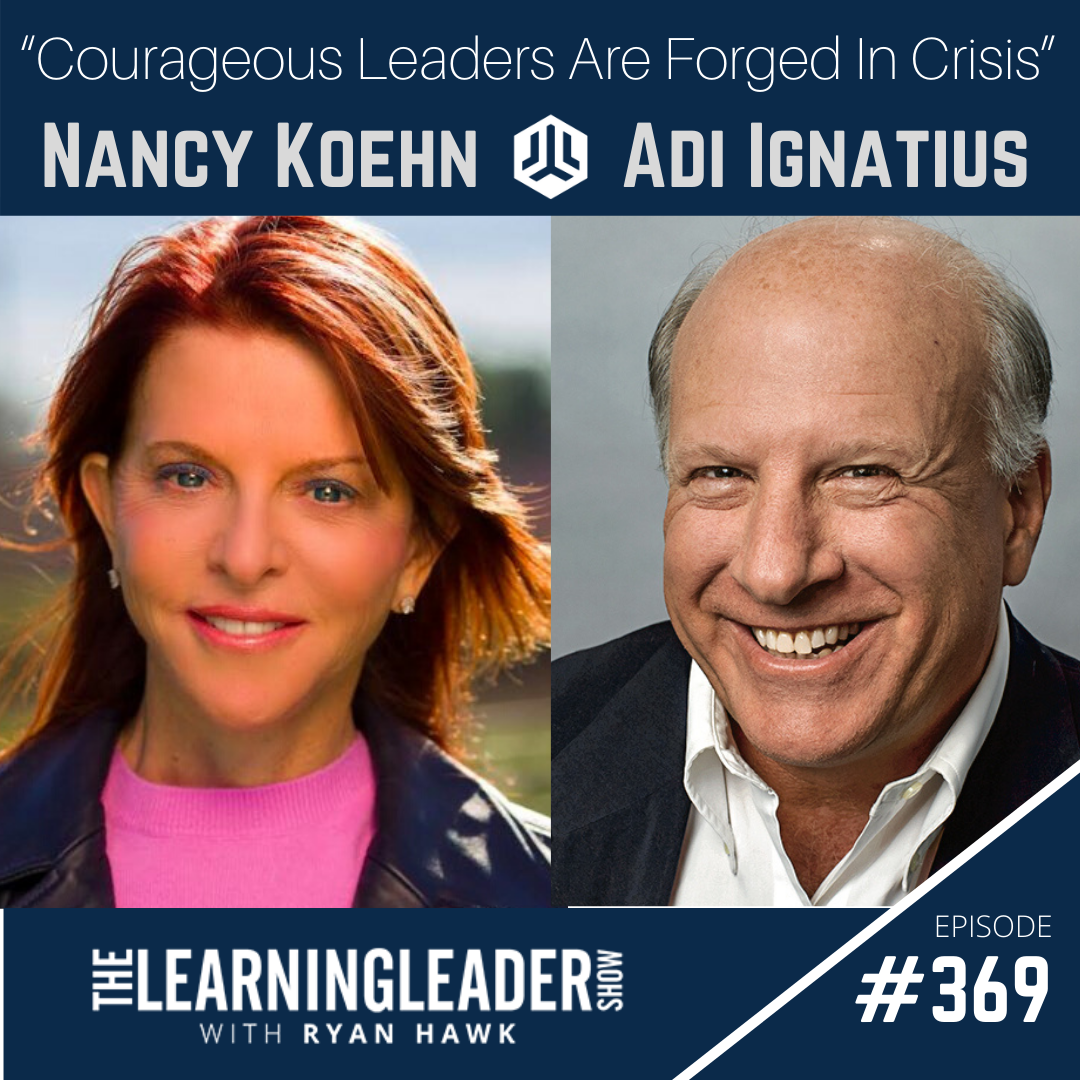Nancy Koehn is a historian at the Harvard Business School where she holds the James E. Robison chair of Business Administration. Koehn’s research focuses on how leaders, past and present, craft lives of purpose, worth, and impact. She’s the author of multiple books, her most recent: Forged in Crisis: The Power of Courageous Leadership in Turbulent Times.
Adi Ignatius is the Editor in Chief of the Harvard Business Review. Previously, he was deputy managing editor for Time, where he was responsible for many of its special editions, including the Person of the Year and Time 100 franchises. Previously, Ignatius served as Time‘s executive editor starting in 2002, responsible for the magazine’s business and international coverage. He wrote frequently for the magazine, including cover stories on Google and the 2007 Person of the Year profile of Russian leader Vladimir Putin.
FORBES recently called WELCOME TO MANAGEMENT, “the best leadership book of 2020.”
Check out the pop-up podcast hosted by Nancy & Adi called “Real Leaders” as well. Here is the link to the Ernest Shackleton episode.
Be part of “Mindful Monday” — Text LEARNERS to 44222
Subscribe on iTunes or Stitcher Radio
The Learning Leader Show
- Sustaining excellence =
- Leaders are made, not born
- “Crisis are great greenhouses to make great leaders”
- Resilience – It’s a muscle built over time
- A unique combination – The ability to commit, married to that, but flexibility to the means to make it happen
- Empathy & Emotional awareness – How a leader shows up in service to the mission
- Convey conviction and confidence
- A real sense of how much impact a leader has. Humble and own the sense that they have great influence.
- They use it to help people overcome their own limitations
- Leaders are made, not born
- Adi – Understand the long term. Need the ability to shift.
- Transparency – Direct reports should know where they stand at all times.
- Emotional discipline:
- Don’t send email when you’re mad. Think about the long term impact of what you do.
- JFK – White House discovered missiles in Cuba.
- Read: Guns Of August – How WWI Started
- Slow pace down
- Imagine what Khrushchev would do – Give him room, hold off…
- Use “calculated empathy”
- Read: Guns Of August – How WWI Started
- Standing up to others like Winston Churchill – He stood up to the opposition.
- Dunkirk – Leadership when everything changes
- Ernest Shackleton – He took 27 men to Antarctica
- How did he avoid mutiny in the midst of huge adversity?
- He had the trust of his men. They believed he cared about them.
- Emotional awareness – He addressed their fears – “What can I do to address their fears?”
- Extraordinary ability to toggle seamlessly between little things like the weather and the big picture. Zoom in and zoom out.
- How did he avoid mutiny in the midst of huge adversity?
- Pay attention to the mundane – The daily work schedule. Stick to the routine. And also have a plan to solve the problem.
- How to lead a remote team:
- It’s reassuring to have your leaders step up and speak the truth. “Here’s what we’re going to do…”
- False optimism doesn’t help. Honesty is critical.
- Brutal honesty + credible hope… Share the team’s capabilities, the history. “Nothing to fear but fear itself.”
- It’s reassuring to have your leaders step up and speak the truth. “Here’s what we’re going to do…”
- Great leaders ‘feed their team.’
- Leaders in crisis: Shackleton gave duties to each man. They regularly changed duties to stay fresh.
- Isolation feeds fear. It feeds the ‘worst case scenario’ in the minds of people.
- Shackleton combated that by forcing them to socialize. They told stories, had skits, made up games. He empowered his team.
- It’s important to have rituals that bring you back to a good place. For Nancy: 1) Deep breaths 2) Classical music 3) Walks
- Adi: Meditates daily, 10 minutes of breath work.
- Connect, Connect, Connect with others. Say thank you. Shift places depending on the type of work.
- Adi: Meditates daily, 10 minutes of breath work.
- President Lincoln had no plans for winning the way. “I navigated from point to point.”
- “Great careers are build on passion and the dedication to do the work.”
- Gather years in every career. You do not always need to check off boxes.
- “Life is long. Don’t burn bridges.”
- The benefits of teaching:
- “It keeps you honest. You have to think like a chess player. You must stoke the fires of curiosity.”
- Here is WHY joining a Learning Leader Circle is a good idea…
Resources:
- Read: WELCOME TO MANAGEMENT
- Be part of “Mindful Monday” — Text LEARNERS to 44222
- Read: Forged In Crisis
- Connect with me on LinkedIn
- Join our Facebook Group: The Learning Leader Community
- To Follow Me on Twitter: @RyanHawk12
More Learning:
Episode 078: Kat Cole – From Hooters Waitress To President of Cinnabon
Episode 216: Jim Collins — How To Go From Good To Great
Episode #300: AJ & Keith Hawk – How To Instill Work Ethic & Curiosity In Your Children
Episode #303: General Stanley McChrystal – The New Definition Of Leadership


Leave A Comment